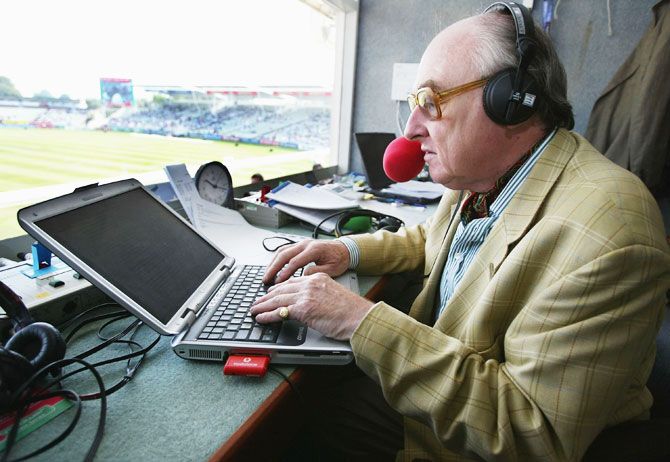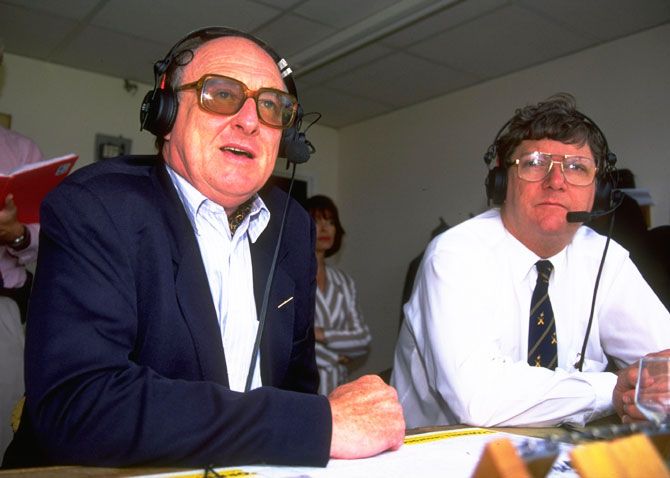Henry Blofeld, who charmed the cricket world for more than 40 years, bids farewell to the microphone come September.
Haresh Pandya salutes the Master.

Henry Blofeld will always be remembered as one of the most distinctive and vividly entertaining voices in cricket.
Full of good humour, exuberance and outrageous candour, he was THE cricket commentator for his legions of fans the world over.
|
I like to try and paint the scene. You've got to give the complete scene, the complete picture. You've to set the scene for the listeners who are not present. It's most essential to make them feel that they are there.
|
'Blofeld lives for cricket,' the late Christopher Martin-Jenkins once remarked, 'pursuing it round the globe with only slightly less enthusiasm than he follows his ladies.'
A huge banner proclaiming 'Henry Blofeld is God' during the 1996 England-Pakistan Test at Headingley, Leeds, said it all.
Every year there has been a substantial increase in the members of the Henry Blofeld Fan Club. Blofeld himself termed it, with typical British understatement, 'extraordinary'.
BBC's Test Match Special will wear a deserted look when Blofeld bids adieu come September.
When Blofeld is at the mike, commentary can never be dull.
The man simply loves to talk. And he talks really well.
Besides his booming voice and his Etonian accent, Blofeld can quick sketch the completeness of a cricketing moment.
His bubbly, helter-skelter, commentary more than adequately compensates for the most listless proceedings on the field.
What is the secret of his popularity?
"I've no idea," he once told me in an interview.
"You probably know why people like me, but I myself don't know."
"I don't listen to myself. I just talk as I talk, whether I'm with a friend or on the radio."
"Maybe I'm different from the rest. Maybe I make people laugh. Maybe it's just because I say surprising things sometimes."

Henry Calthorpe Blofeld was born at the Hoveton home farm in Norfolk on September 23, 1939.
After he learnt to play the game at age 7, cricket has been at the centre of his life.
Until he was 17, he played with some success as a wicket-keeper and opening bat.
He was in the Eton XI from 1955 to 1957, the last year as captain.
In 1956, when he was 16, he scored a century for the Public Schools against the Combined Services in their annual two-day game at Lord's, joining Peter May and Colin Cowdrey as the only other two schoolboy cricketers to have done so.
Unfortunately, the next year he met with a serious road accident, hit by a bus while riding a bicycle to the Eton cricket ground.
Although he made a remarkable recovery, Blofeld was never the same cricketer again.
He did fulfil his childhood wish when, representing a weak Cambridge University side in 1959, he made a first-class hundred against the MCC at Lord's.
Blofeld's cricketing promise may have been snuffed out, but the game's loss was cricket journalism's gain.
He became a cricket journalist, contributing to The Times, The Guardian, The Observer, The Daily Telegraph and The Sunday Express.
He covered England's 1963-1964 tour of India for The Guardian. And came close to playing for England.
Micky Stewart was ill for the second Test in Bombay and the England team management thought Blofeld was an ideal replacement for Alec's dad.
When England Manager David Clark asked him to get ready, Blofeld said: 'I would certainly play if needed, but if I scored 50 or upwards in either innings I was damned if I would stand down for the Calcutta Test.'
Mickey Stewart was discharged from hospital on the first morning of the Test and was picked in the playing XI despite having not fully recovered.
The decision proved disastrous. Stewart had to be rushed back to hospital after tea. He played no further part on the tour.
|
You've to keep experimenting at times. I don't think it's possible to have a perfect commentator -- at least I don't come in this category.
|
Blofeld joined the BBC's panel of Test match commentators in 1974, sharing the mike with legends like John Arlott and Brian Johnston.
It was the "turning point" in his dramatic cricket life. He soon carved a niche as a radio broadcaster despite the presence of those titans in the commentary box.
Blofeld, a national institution for the English, is, curiously enough, not a big fan of his own voice.
"I hate listening to myself on the radio," he revealed to me.
"I always think I sound like such an ungovernably pompous prat."

"I don't think I've done a bad job, writing and commentating on the game simultaneously," he said.
Although equally successful as a cricket writer, Blofeld accepted that he enjoyed broadcasting more.
"I think the two roles, writing and broadcasting, probably correspond well with each other. When you are commentating, you are actually very much involved in the game with ball by ball happenings on the field."
"When you write at the end of the game you think rather more deeply about it," he said.
"And because you are commentating you are actually aware, perhaps more aware, of the things going on and it helps you write better copy later on."
"I enjoy the two roles in their own different ways. Having said that, I suppose I enjoy commentating on the game more than writing on it."
"But more than writing daily reports for the newspapers, I enormously love writing books on the game. And my books aren't entirely about cricket either. But that's a different story altogether."
|
I can't obey the rules laid down for the television commentator. 'I can't resist the opportunities to poke fun at people and things. Television producers don't like this. It wasn't a happy experience to be a television commentator. I wish I had never done it.
|
Blofeld made you believe that he never thought about his "strength" as a commentator.
"I'm just myself. That's all," he said.
"I like to try and paint the scene. You've got to give the complete scene, the complete picture."
"You've to set the scene for the listeners who are not present at the place of action. I think it's most essential to make them feel that they are there."
"And you've to remain true to yourself, your subject and all that you're commentating about."
"I sometimes even try to paint the picture. I like to talk about the things which may interest the listeners."
"Yes, I've a sense of humour. But I've also had a great sense of the ridiculous."
"If I see something, whether it's good or bad, I just talk about it. You may like it or not, but that's the way I'm."

They were commenting on the 5th Test between England and the West Indies at Trent Bridge, Nottingham, August 1995.
Photograph: Adrian Murrell/Getty Images
There was a time when Blofeld's obsession with buses, trains and planes, just like his obsession with beautiful ladies and their earrings in Sharjah in the 1990s while doing television commentary, led his producer to instruct him not to mention them at all in his commentary.
Undaunted, Blofeld focused on helicopters and other modes of transport.
Why, he made a sensational discovery, a Henry Blofeld exclusive, that a butterfly had just "walked" across the wicket at The Oval.
It requires hawk-like eyesight to spot a butterfly walking around the pitch, and that too from as far as the commentary box!
"If you talk only about cricket, it can get rather arid," Blofeld said.
"A game of cricket is like a symphony -- it's got passages of quick, slow, quick."
"In the slow passages, when nothing much is happening, if you don't go outside the game, your listeners get rather bored."
"I'm sure I'm irritating some people, and I've had some unbelievably rude letters. But I'm too old to change the way I do things now."
"The only question is whether the BBC goes on employing me," he said.
Blofeld's bloopers are well known.
'In the rear, the small diminutive figure of Shoaib Mohammed, who can't be much taller or shorter than he is!' he announced once.
He once referred to Monty Panesar as 'Monty Python' and Ryan Sidebottom as 'Ryan Stringfellow'!
Asked if he missed Arlott and Johnston, Blofeld said, "You miss them. But life has got to go on."
"In England they say, 'The king is dead, long live the king.' And then someone takes over."
"Arlott retired in 1980 and died in 1991. Johnston passed away in 1994. They had distinguished innings as radio broadcasters," he said.
"When Arlott gave up commentary, his absence was not felt much because we still had Johnston."
"But Johnston in particular was sorely missed. It was a great gap for the first couple of years, but Jonathan Agnew has taken on so well."
"He has built his own reputation which speaks volumes for his commentating skills. As a person Johnston was the most admired in the world and I in particular miss him very much."

The most colourful of all cricket commentators, Blofeld believes there is no such thing as a "perfect" broadcaster.
"I think everybody should try to reach the level of Arlott and Johnston. Of course, the game has seen many other broadcasters who have been outstanding in their own different ways. Rex Alston, for instance," he emphasised.
"There are always ways to try to be good; there are always ways to try to be better."
"You've to keep experimenting at times. Yet, I don't think it's possible to have a perfect commentator -- at least I don't come in this category."
|
A game of cricket is like a symphony -- it's got passages of quick, slow, quick. In the slow passages, when nothing much is happening, if you don't go outside the game, I think your listeners get rather bored. I'm sure I'm irritating some people, and I've had some unbelievably rude letters. But I'm too old to change the way I do things now.
|
It is no secret that the loquacious, restless Blofeld finds himself "uncomfortable" in the television commentary box.
"Of course, I've done television commentary for a while. But I was never a regular. I'm not good at it."
"Frankly, my heart isn't into it. I don't enjoy it. I can't obey the rules laid down for the television commentator."
"I always prefer radio to television. I just can't resist the opportunities to poke fun at people and things. Television producers don't like this."
"It wasn't a happy experience to be a television commentator. I wish I had never done it."
"I relish talking and television simply doesn't permit this." he said.

Where did Blofeld's inspiration come from?
"It comes from the fact that I enjoy cricket immensely," he said.
"I do the job to the best of my ability. If you are a professional, you shouldn't depend on moods. You can't afford it."
Blofeld sung praises of his fellow BBC commentators. "They are brilliant. Absolutely brilliant," he said. "I'm just hanging on there on my finger-tips! They are much too good for me."
"I'm getting too old. I think they are terribly good and I love listening to them. I think they are just as popular, perhaps more popular now, as the past masters."
"Radio commentary in England is much more popular than television broadcasting," he felt. "And there is a tremendous future for radio commentary."
"Television producers are desperate. They don't like humour, they don't like romance. But we have humour and romance aplenty on the radio."
"A lot of people have more fun listening to us on the radio compared to those broadcasting for television. The future of radio broadcasting, as far as cricket is concerned, is absolutely assured."
"Test Match Special is much more popular in England than it has ever been. I would go as far as saying that radio commentary is almost the most assured thing in the media."
Always a livewire, Blofeld says he has lived a "full" and "happy" life.
He has had a "long and fruitful" innings.
He has "enjoyed everything immensely" and has "no complaints, no regrets whatsoever".







 © 2025
© 2025